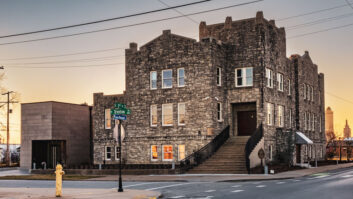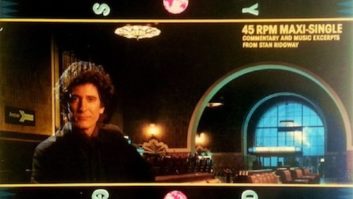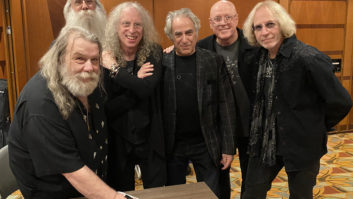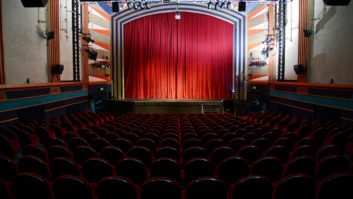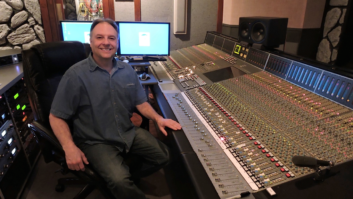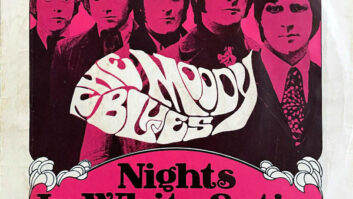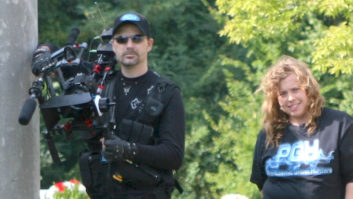On August 22, Denny Purcell was found dead in his Georgetown Masters studios at the age of 51, leaving behind a legacy of bad jokes, good friends, a loving family and more than 500 Gold and Platinum records. Denny’s commitment to quality, his passion for music and his zest for life touched everyone he came in contact with. We asked a few of those friends and family to share their remembrances, beginning with our Nashville editor, Rick Clark, who says, “He didn’t need a last name in this town. In Nashville, he was simply Denny.” For more tributes, visitwww.mixonline.com.
To watch Denny dial into the music at a mastering session was to witness his commitment to making every nuance matter “for the sake of the song,” to borrow a title of one of Denny’s favorite songwriters, Townes Van Zandt. Denny loved music passionately, and in that spirit, every nook and cranny of Georgetown has always been a reflection of his love for great musical artistry. He could’ve covered the walls with Gold and Platinum awards, but instead chose classic guitars and pictures of friends and artists like Duane Eddy, Neil Young, Nanci Griffith and the legendary Chet Atkins, whose picture was propped above his cigar humidor and next to the last guitar he played. On the floor by the front desk is an old Epiphone Electar “Zephyr” guitar amp that was used and pictured on Neil Young’s Harvest album.
In any other place, these rarities would constitute a museum. At Georgetown, Denny just loved it when someone would play them. To him, the instruments and memorabilia were a heartfelt conveyance of an ongoing celebration of the creative musical spirit. Often, Georgetown felt like the front porch refuge of an old small-town dry goods store, where jokes, philosophy, street gossip and music were freely shared.
The one Denny memory I will cherish the most happened less than two weeks before he passed away. It was while he was beginning mastering work on a surround collection of classic Emmylou Harris tracks produced by Brian Ahern.
During the auditioning of Harris’ beautifully evocative version of “Too Far Gone,” all of the channels unexpectedly dropped out and there was her voice, all by itself, coming out of the center channel. Instead of stopping the tape and seeing what had caused the problem, Denny went with the flow, and we sat there alone in that darkened room, listening to Emmy pouring her heart out, like she was standing in front of us, singing with such intimacy and vulnerability that it was spooky. After a few moments, Denny and I looked at each other and raised our arms in the half-light — there were chill bumps covering them. He smiled, pointed to his arm and said, “These are real. We are hearing magic.”
A few days later, at Norbert Putnam’s birthday party, Denny sidled up to me and said, “You know when all those channels dropped out during ‘Too Far Gone’? Well, for the first few moments, I sat there trying to look like I knew what I was doing, but I didn’t have a clue what happened. But I’m so glad it happened, because it was one of the most special moments I’ve had in a long time.”
— Rick Clark
MY FRIEND…
Denny Purcell was the most loving man I ever knew. As a mastering engineer, he was exceptional, but as a friend, he was without peer. Denny’s smiling face at the top of Georgetown’s staircase signaled another happy ending for the many record producers who made the climb to the top. I considered him to be a part of my family, and when I saw his smiling face adorning the pages of a trade magazine, I was as proud as a blood brother. But when Denny and I were alone, we didn’t listen to music; we usually talked about our families, about how the success we had achieved had enriched their lives. He once said, “Norbert, if we work extra hard and always do our best, we can take better care of our families.” My friend Denny Purcell worked extra hard, and his family, like the rest of us, benefited greatly.
— Norbert Putnam
NEVER FORGOTTEN
I met Denny Purcell in 1985 on my first trip to Nashville, troubleshooting a Neil Young video 1610 to laserdisc transfer. Since I was there, Neil had asked me to stop by Georgetown and retrieve the tapes for his Old Ways album, which Denny had mastered. Within five minutes, Denny had my flights rebooked, my hotel changed and my next 18 hours scheduled. Our relationship never changed. I can’t think of one phone call or visit that didn’t end with, “When are you bringing the family out to my lake house? The fridge is stocked, my Mercedes is yours and we will catch some fish!”
— John Nowland
RE-DEDICATED
Denny put more passion into his work than most anybody I have ever known. Doing it great was Denny’s goal. He believed that people enjoyed music more when it sounded better. And he knew what “better” was. When Neil asked me to do a DVD-A version of Harvest, I called Denny, who helped me and inspired me tremendously.
The sad thing is that Denny never got to see the thing in the stores. We are trying to see if it is not too late to put a dedication for him on the DVD.
— Elliot Mazer
A FISHING TALE
After several projects with Denny, I realized what a good friend he had become. He cared so much about family; his children were his life, and he was so proud of them. In April 2001, I had to come out to Nashville for some business. Denny said, “Rory, why don’t you bring your daughter and I’ll take you fishing at Jim Henry’s.” So, I took my daughter with me. Denny was telling my daughter the secrets of life; he was so sincere, and nothing but passion. He taught Elise how to bait her line, cast and catch. Well, Denny and I caught about 40 to 50 fish each, while Elise caught 104. She was glowing like the sun, and Denny just smiled as if he gave her one of the greatest gifts she could have had, and it was!
— Rory S. Kaplan
MY MASTER MAN
Denny had a trait all of us in the music business could learn from. The way he mastered an album…you can’t teach that. This is what he was born to do, and I’m very proud to say that in my career, no one has ever mastered an album of mine but Denny.
— Garth Brooks
FAREWELL, MY BROTHER
Denny loved songs, and he treated everybody’s songs as if they were his own. But that was Denny’s attitude toward life in general: that every person and everything was intriguing and worth understanding. Two of Denny’s best friends were a multi-Platinum music legend and a homeless, jobless person who nobody else would even take the time to look straight in the eye. That explains why a person with so many achievements in life chose to line the walls of his studio not with awards, but with musical instruments.
On the particularly long days when I would leave the studio at 3 or 4 in the morning and come back a couple of hours later, he would always leave me a note where we were working. I found one he had written last week. He wrote:
“Years from now, someone will listen to what we’ve done and know we were here.
They may not know or care who we were. But they’ll hear our music speaking for us.
And just maybe they’ll understand something.
That’s the way it’s supposed to be.
The players come and go, but the music lives on.
Eternity will take care of the rest.”
— Andrew Menelson, Georgetown Masters
LISTEN TO THIS!
Denny heard things that no one else could hear. One day, I was at Georgetown and happened to mention how much I enjoyed the new Dylan album, Love and Theft, and Denny’s eyes lit up. I said that I had listened to one track in particular, a song called “Mississippi,” at least 100 times. Denny beamed and asked, “Did you hear what they did at 2:37, going into the second bridge?” I shook my head no. Denny immediately stopped what he was doing, cued up the song and played the section for me twice. But I couldn’t discern anything different from anywhere else on the track. Like a high school kid, Denny pointed out a move one of the guitarists made that was completely different from the two other bridge entrances, something very subtle and nuanced, yet deliberate, powerful and very important to the feel of the song. Something only Denny could hear.
— Steve Fishell
THE DENNY EXPERIENCE
Even in a business filled with gentle, kind, creative people, Denny Purcell stood out as one of the sweetest of all. Denny shared his workplace, his friends and his family with all of us who knew him. Many of us got to know his entire family and watch his five children he was so proud of grow up. Georgetown Masters was a meeting place for all kinds of people. Often dropping in to see Denny (at his standing invitation), I would meet many legendary artists, producers, record company executives and, of course, engineers. Some were old friends and some I knew only by reputation. Whether working or visiting, a few hours spent at Georgetown was always an uplifting “Denny experience.”
— Duane Eddy
THE POPSICLE STORY
This is the story of how Denny Purcell came to Nashville to seek his fame and fortune. In January 1970, he brought his first wife and daughter to Nashville. He went door to door down Music Row hoping to get in and just hang out. He met Gene Eichelberger at Quadraphonic Studios. Some days, he would let him come in. Many days, there would be closed sessions and he was turned away. He became very discouraged.
Summer was coming, and Denny needed money for his family. A popsicle truck came down the street every day. I would get very excited when I heard it coming. Denny decided that this could be fun so he signed on and became a Popsicle man. He was given a route in Hendersonville, where he sold one to Johnny Cash. This was very exciting to him. Being the businessman that he was, he decided he could make more money if he bought his own truck. The Ice Cream Company let him borrow a freezer box to set on the back of his old pickup. Unfortunately, it was not electric, and by the end of the day, whatever product was left had usually melted. So what he didn’t give away or consume was thrown out by the end of the day.
He realized that this was a distraction from his original plan so he gave up the popsicle biz and became more active with his visits to Gene and the studio. Before long, he was asked to go out for coffee or sandwiches for the clients. Then he was asked to borrow equipment from other studios. One thing led to another…It’s like a fairy tale where dreams can come true.
— Rissie Purcell, eldest daughter
